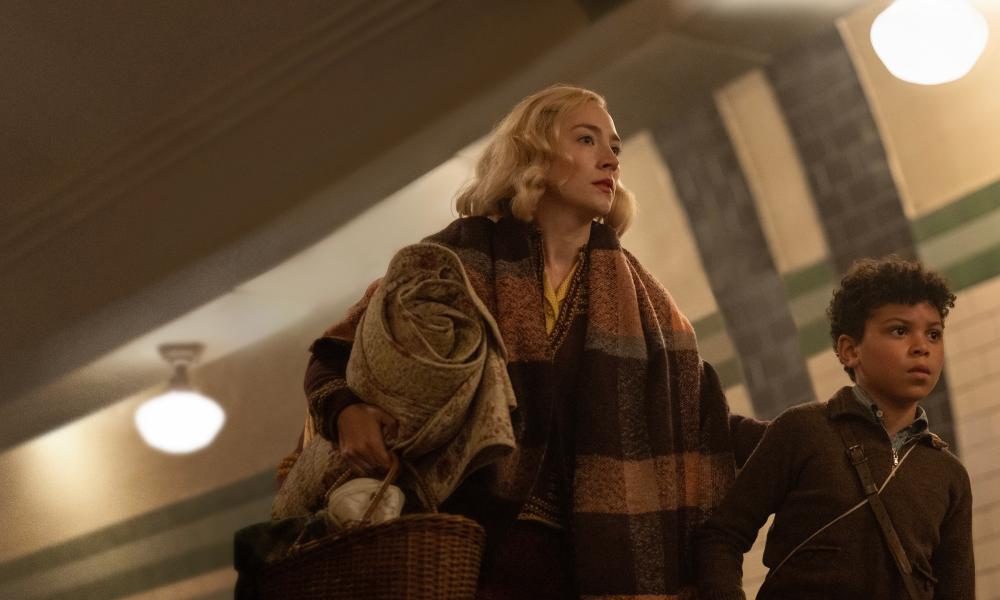
‘NOT MANY PEOPLE KNOW WHAT HAPPENED’: COVERED UP LONDON BLITZ TRAGEDY IS INSPIRATION FOR STEVE MCQUEEN’S NEW FILM
The Oscar-winning British film director, Sir Steve McQueen, who is most famous for bringing the horror of the slave trade to cinema screens, has turned his lens on the forgotten, and even officially censored, terrors that London underwent during the second world war.
His starry new film, Blitz, which opens the London film festival (LFF) next month, is a powerful evocation of the perils of life during the German Blitzkrieg – a bombing campaign that aimed to batter Britain into submission in the early 1940s. McQueen, whose most recent film, Occupied City, was a long study of the impact of the war and the Holocaust on Amsterdam, was partly inspired to make Blitz by learning of a catastrophe at an east London tube station. Details were suppressed by the wartime government to protect public morale.
Speaking to the Observer as he worked on the film two years ago, the director said: “Not many people seem to know about what happened at Bethnal Green. In fact, so many things came up in research [for the film] and made me think: ‘How come I did not know about that? I am very excited to be able to show these things to a British audience.’”
He now adds that the Balham tube station disaster, in which 68 people taking shelter there were killed when a German bomb exploded underground causing massive flooding, was also an important inspiration.
McQueen and his wife, the Dutch director Bianca Stigter, who worked with him on Occupied City, said they are both motivated to tell difficult stories that they believe are in danger of being lost to subsequent generations.
Blitz, which has its world premiere at an LFF gala night on 9 October, stars Saoirse Ronan as an East End mother who tries to take her nine-year-old son out of London to safety, urged on by her father, played by the singer Paul Weller. But the boy is not happy to leave the city and the film follows his precarious journey back across the capital as he encounters Londoners struggling to cope with the fear and separations caused by war. The wider cast includes Kathy Burke, Stephen Graham, Hayley Squires, Harris Dickinson and the musician Benjamin Clementine.
The look of the city at war is recreated in detail by Adam Stockhausen, who also worked on 12 Years a Slave, McQueen’s acclaimed 2013 treatment of slavery.
One of the events that prompted McQueen to make the film took place on the evening of 3 March 1943 at Bethnal Green tube station, which at that time was only half completed. In a disaster that was to take the greatest number of lives on the tube system during the entire blitz, a chain of accidents conspired to produce an appalling crush.
An air-raid warning had sounded and, as usual, residents rushed to take shelter inside the station. Air attacks had died down in recent weeks, but allied bombing of Berlin that week had brought fears of reprisals. So the shelter was more crowded than usual and the arrival of three buses at the entrance to the station added to the numbers.
The crush that killed 173 people, including 62 children, is thought to have been prompted by a mother carrying a baby who slipped on the steps. In the pitch dark of the night-time blackout, no one could see, and people fell over each other. Panic was exacerbated by the sound of a new anti-aircraft rocket being test-fired in nearby Victoria Park. Many assumed it was the latest German weapon.
Hundreds were pinned inside a stairwell only a few feet wide, with no handrail, and soon they could not breathe. Both survivors and rescuers suffered lifelong trauma, even though no bombs were dropped on that part of Bethnal Green that night. The Ministry of Home Security subsequently estimated there were nearly 2,000 people inside the station at the time. A government inquiry was convened, but the outcome was kept quiet until the end of the war to avoid a propaganda win for the enemy.
Related: ‘Now I owned a private war’: Lee Miller and the female journalists who broke battlefield rules
Last year, the same incident inspired the bestselling debut novel Nineteen Steps by Stranger Things actor Millie Bobby Brown. She learned of the disaster through her grandmother Ruth, who survived it. In 2017, a monument, Stairway to Heaven, was erected near the tube station to commemorate the lives of those killed.
It has now been revealed that local councillors had earlier asked for funds to alter the entrance and put in a central handrail. The day after the deaths, the council was sworn to secrecy. New handrails were installed and the steps were marked with paint. Other station entrances were also improved.
Ahead of the premiere, McQueen said: “Blitz is a movie about Londoners. It honours the spirit of what and how Londoners endured during the blitz, but also explores the true representation of people in London. At its core is the story of a working-class family desperate to be reunited.”
• This article was amended on 18 September 2024 to include reference to the Balham station disaster being a key inspiration for the film.
2024-09-15T07:07:38Z dg43tfdfdgfd